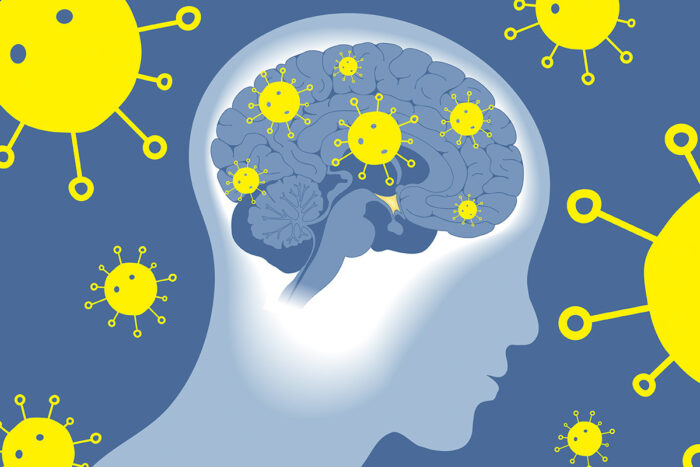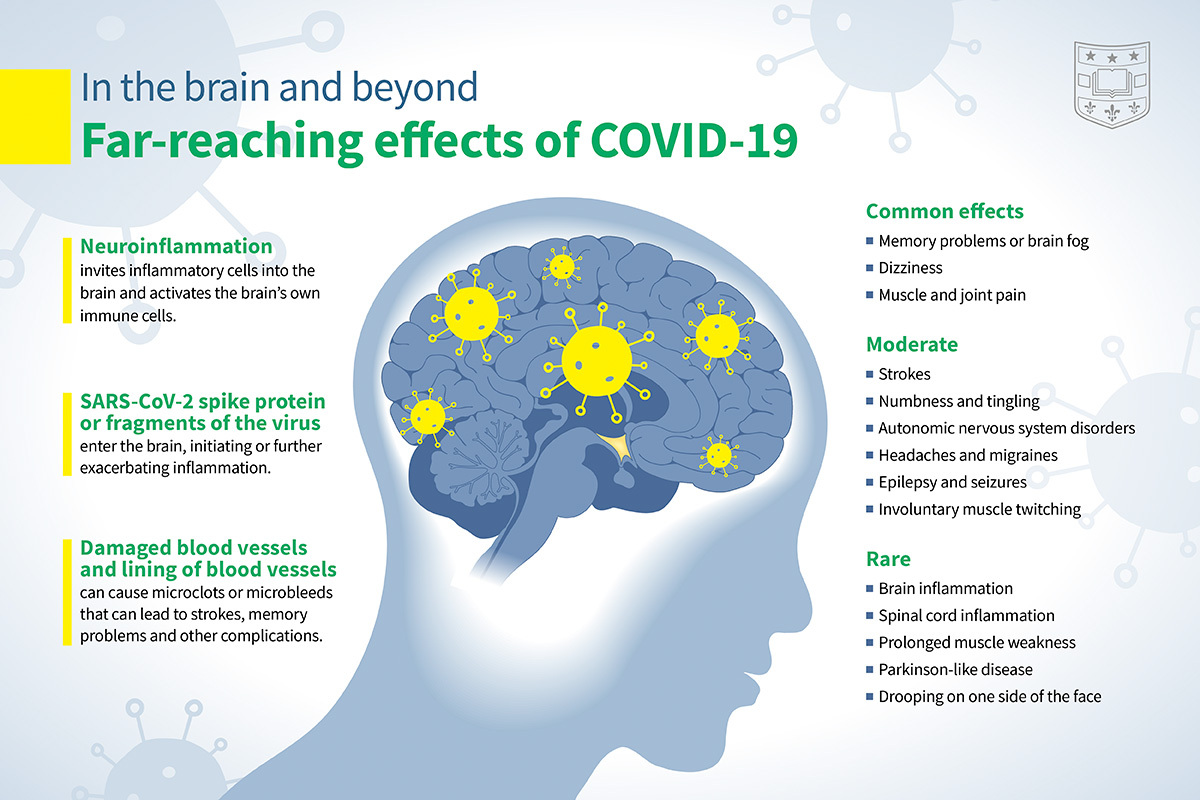COVID-19 infections increase risk of long-term brain problems
Strokes, seizures, memory and movement disorders among problems that develop in first year after infection
 Sara Moser
Sara MoserA comprehensive analysis of federal data by researchers at Washington University School of Medicine in St. Louis shows people who have had COVID-19 are at an elevated risk of developing neurological conditions within the first year after infection. Movement disorders, memory problems, strokes and seizures are among the complications.
If you’ve had COVID-19, it may still be messing with your brain. Those who have been infected with the virus are at increased risk of developing a range of neurological conditions in the first year after the infection, new research shows. Such complications include strokes, cognitive and memory problems, depression, anxiety and migraine headaches, according to a comprehensive analysis of federal health data by researchers at Washington University School of Medicine in St. Louis and the Veterans Affairs St. Louis Health Care system.
Additionally, the post-COVID brain is associated with movement disorders, from tremors and involuntary muscle contractions to epileptic seizures, hearing and vision abnormalities, and balance and coordination difficulties as well as other symptoms similar to what is experienced with Parkinson’s disease.
The findings are published Sept. 22 in Nature Medicine.
“Our study provides a comprehensive assessment of the long-term neurologic consequences of COVID-19,” said senior author Ziyad Al-Aly, MD, a clinical epidemiologist at Washington University. “Past studies have examined a narrower set of neurological outcomes, mostly in hospitalized patients. We evaluated 44 brain and other neurologic disorders among both nonhospitalized and hospitalized patients, including those admitted to the intensive care unit. The results show the devastating long-term effects of COVID-19. These are part and parcel of long COVID. The virus is not always as benign as some people think it is.”
Overall, COVID-19 has contributed to more than 40 million new cases of neurological disorders worldwide, Al-Aly said.
Other than having a COVID infection, specific risk factors for long-term neurological problems are scarce. “We’re seeing brain problems in previously healthy individuals and those who have had mild infections,” Al-Aly said. “It doesn’t matter if you are young or old, female or male, or what your race is. It doesn’t matter if you smoked or not, or if you had other unhealthy habits or conditions.”
Few people in the study were vaccinated for COVID-19 because the vaccines were not yet widely available during the time span of the study, from March 2020 through early January 2021. The data also predates delta, omicron and other COVID variants.
A previous study in Nature Medicine led by Al-Aly found that vaccines slightly reduce — by about 20% — the risk of long-term brain problems. “It is definitely important to get vaccinated but also important to understand that they do not offer complete protection against these long-term neurologic disorders,” Al-Aly said.
The researchers analyzed about 14 million de-identified medical records in a database maintained by the U.S. Department of Veterans Affairs, the nation’s largest integrated health-care system. Patients included all ages, races and sexes.
They created a controlled data set of 154,000 people who had tested positive for COVID-19 sometime from March 1, 2020, through Jan. 15, 2021, and who had survived the first 30 days after infection. Statistical modeling was used to compare neurological outcomes in the COVID-19 data set with two other groups of people not infected with the virus: a control group of more than 5.6 million patients who did not have COVID-19 during the same time frame; and a control group of more than 5.8 million people from March 2018 to December 31, 2019, long before the virus infected and killed millions across the globe.
 Sara Moser
Sara MoserThe researchers examined brain health over a year-long period. Neurological conditions occurred in 7% more people with COVID-19 compared with those who had not been infected with the virus. Extrapolating this percentage based on the number of COVID-19 cases in the U.S., that translates to roughly 6.6 million people who have suffered brain impairments associated with the virus.
Memory problems — colloquially called brain fog — are one of the most common brain-related, long-COVID symptoms. Compared with those in the control groups, people who contracted the virus were at a 77% increased risk of developing memory problems. “These problems resolve in some people but persist in many others,” Al-Aly said. “At this point, the proportion of people who get better versus those with long-lasting problems is unknown.”
Interestingly, the researchers noted an increased risk of Alzheimer’s disease among those infected with the virus. There were two more cases of Alzheimer’s per 1,000 people with COVID-19 compared with the control groups. “It’s unlikely that someone who has had COVID-19 will just get Alzheimer’s out of the blue,” Al-Aly said. “Alzheimer’s takes years to manifest. But what we suspect is happening is that people who have a predisposition to Alzheimer’s may be pushed over the edge by COVID, meaning they’re on a faster track to develop the disease. It’s rare but concerning.”
Also compared to the control groups, people who had the virus were 50% more likely to suffer from an ischemic stroke, which strikes when a blood clot or other obstruction blocks an artery’s ability to supply blood and oxygen to the brain. Ischemic strokes account for the majority of all strokes, and can lead to difficulty speaking, cognitive confusion, vision problems, the loss of feeling on one side of the body, permanent brain damage, paralysis and death.
“There have been several studies by other researchers that have shown, in mice and humans, that SARS-CoV-2 can attack the lining of the blood vessels and then then trigger a stroke or seizure,” Al-Aly said. “It helps explain how someone with no risk factors could suddenly have a stroke.”
Overall, compared to the uninfected, people who had COVID-19 were 80% more likely to suffer from epilepsy or seizures, 43% more likely to develop mental health disorders such as anxiety or depression, 35% more likely to experience mild to severe headaches, and 42% more likely to encounter movement disorders. The latter includes involuntary muscle contractions, tremors and other Parkinson’s-like symptoms.
COVID-19 sufferers were also 30% more likely to have eye problems such as blurred vision, dryness and retinal inflammation; and they were 22% more likely to develop hearing abnormalities such as tinnitus, or ringing in the ears.
“Our study adds to this growing body of evidence by providing a comprehensive account of the neurologic consequences of COVID-19 one year after infection,” Al-Aly said.
Long COVID’s effects on the brain and other systems emphasize the need for governments and health systems to develop policy, and public health and prevention strategies to manage the ongoing pandemic and devise plans for a post-COVID world, Al-Aly said. “Given the colossal scale of the pandemic, meeting these challenges requires urgent and coordinated — but, so far, absent — global, national and regional response strategies,” he said.






 Related:
Related: 

